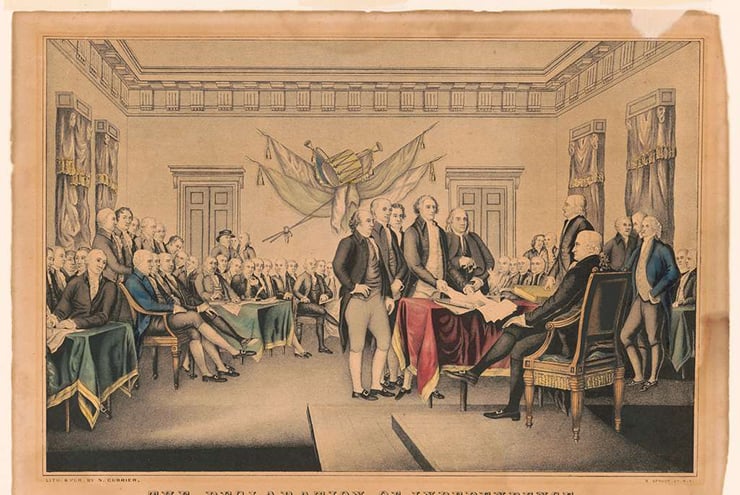Brion McClanahan, in podcast commentary about my editorial from the January issue of Chronicles, raised questions about which early Americans were “conservatives.” McClanahan addressed this matter while commenting on Russell Kirk’s classic work The Conservative Mind (1953). He was puzzled that Kirk would stick into the Anglo-American conservative tradition a New England Federalist like John Adams—along with what for McClanahan are more acceptable conservatives, that is, those in the Jeffersonian tradition.
Apparently, those who favored a strong central government for the infant American republic, including Alexander Hamilton and Adams, cannot be considered “true conservatives,” because their template did not come from Jefferson, who was an early advocate of states’ rights. Since the Confederacy and the interwar American right opposed what Lincon called “consolidated government,” those who in the 1790s or who like the Whigs in the 1840s and 1850s favored strong federal power were necessarily on the left.
Allow me to opt for Kirk’s eclecticism. One may consider Hamilton, Adams, John C. Calhoun, and Robert E. Lee all equally representative of the right, albeit in different ways. Lee was an aristocrat who fought for the state his ancestors settled and led against a devastating invasion. Calhoun sounded like a typical European conservative of his era, especially when defending the necessity of hierarchy and assaulting the doctrine of equality. Finally, Hamilton and Adams took the side of the British monarchy when it battled revolutionary France.
Jefferson, who wrote a passage in the Declaration that still drives authentic Southern conservatives up the wall (“We hold these truths to be self-evident, that all men are created equal, that they are endowed by their Creator with certain unalienable Rights, that among these are Life, Liberty and the pursuit of Happiness.”), also passionately advocated for the French Revolution. He persisted in that fixation well into 1793, even after the revolutionaries began to murder their fellow French. Although a later Jefferson turned in a more conservative direction, I’ve no no idea why one should view the Monticello sage at any point in his life as being philosophically more conservative than Adams or Hamilton. These two reflective Federalists were highly critical of the notion of democratic equality; furthermore, Hamilton even toyed with the idea of making the federal government look more like the British monarchy.
Equally relevant, being for a strong nation-state has not necessarily placed historical figures on the left. European monarchs were consolidating their rule from the late Middle Ages on; and among the architects of strong national governments, we would have to include Lancastrian, Yorkist, Tudor, and Hanoverian monarchs, the Valois and Bourbon kings of France, the Austrian Habsburgs, and the Romanoff dynasty in Russia. Moreover, advocating for small government does not necessarily put someone on the right. The Paris Commune of 1870 and the recent woke autonomous district in Seattle are only two examples of the far left engaging in decentralist schemes. Black nationalists in the 1960s were always itching to declare black neighborhoods autonomous, and the same language more recently has been applied to “sanctuary cities.” When Victor Davis Hanson links leftist autonomous zones to a tradition going back to the Confederacy, he is not entirely wrong. Decentralizing language has been used by both right and left, just as both sides have favored centralized government, in different times and circumstances.
The (real) American right has moved in my lifetime from opposing every aspect of the welfare state to forming an alliance with the working class. I find nothing inconsistent about this change of front. Historical circumstances have changed in a way that has made this realignment inescapable.
This does not exclude the pursuit of other strategies simultaneously, for example, allowing less “progressive” states to operate more and more independently of the feds and doing whatever is possible to drain the swamp of public administration. But it’s delusional to think we can restore the balance between the federal and state governments that existed before the fateful blowup of 1861 or, to use Murray Rothbard’s brilliant phrase, “break the clock of the twentieth century.” We are stuck with the historical cards we’ve been dealt.
I’m truly dumbfounded to see Southern conservatives (I mean the real ones, not Lindsey Graham or Nikki Haley) proclaiming the glories of Donald Trump’s candidacy for president. I’ve no idea how Trump represents the antebellum Southern or Jeffersonian political tradition. He’s a big-government politician, who promises not to touch core entitlement programs and who is in no imaginable way an American regionalist.
Not that I blame my Southern friends for backing Trump, perhaps as the least evil candidate in the presidential contest. But let’s be clear about one thing: this fellow has zilch to do with any Southern tradition of which I am aware. Moreover, the consolidated government he’d protect as president would be much larger and more consolidated than the one that Lincoln bequeathed to posterity. And let’s consider who the more traditional orator was, the president who appealed to the “mystic chords of memory” holding the American nation together or the presidential candidate who engages in childish name calling? Again, I’m not objecting to people choosing among existing evils (which I, too, am forced to do). But let’s not relegate to the left any American historical figure whose politics would have offended the elderly Thomas Jefferson!



Leave a Reply